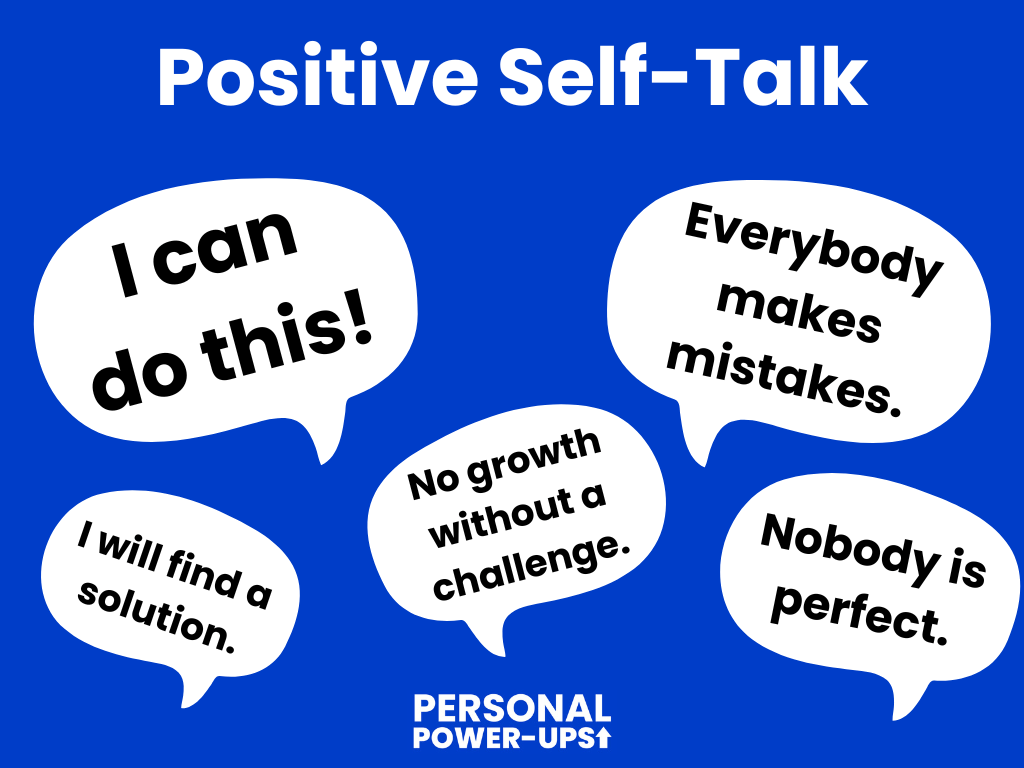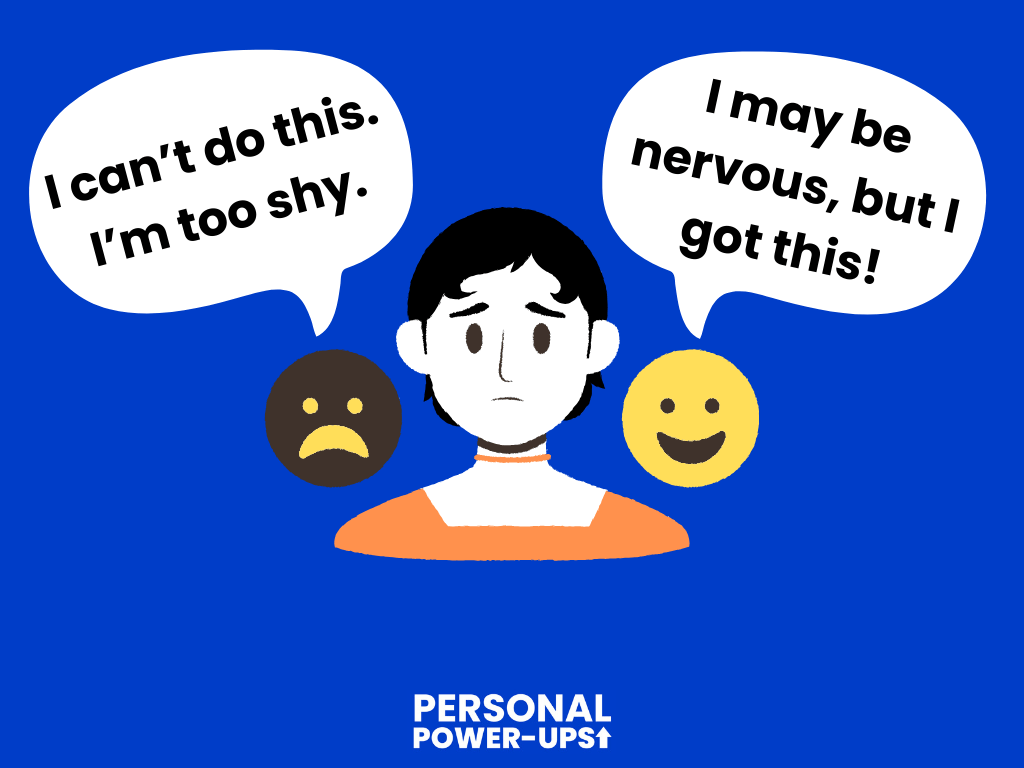Do you find yourself engaging in negative self-talk often? And would you like to know some positive self-talk exercises to change this bad habit?
If so, you’re not alone: negative self-talk is extremely common. Fortunately, you have the power to change your inner dialogue and replace those negative thoughts with positivity and encouragement.
In this blog post, we’ll explore seven powerful positive self-talk exercises that you can start practicing today. These exercises are designed to boost your self-esteem, increase your confidence, and help you create a more optimistic mindset. Let’s get started with this self talk workout!
Table of Contents
What Is Positive Self-Talk?
Self-talk is your internal dialogue; it’s what your subconscious mind is telling yourself. If your self-talk is positive, it can be a force of good. But if your self-talk is negative, it can really hinder your life, and it’s no surprise that a lot of people want to transform their negative self-talk into something more positive.
Your self-talk can be about pretty much anything: from emotions to deep thoughts (like are we alone in the universe?). If those thoughts are positive, it makes you feel good about yourself and about your life. This, in turn, motivates you to achieve more and makes you confident.
What does positive self-talk sound like? Some examples to give you an idea:
- I can do this!
- Everybody makes mistakes.
- I’m improving myself.
- Nothing’s going to stop me.
This is the exact opposite of negative self-talk. Some examples of negative self-talk are believing you are a failure and that you’re an idiot. What you tell yourself will have a huge impact on your life, so this negative self-talk can quickly make you feel anxious and sad. This can easily lead to mental health problems.
Conversely, positive self-talk offers lots of benefits, like reducing stress and improving your mood. So let’s get going and dive into the 7 positive self-talk exercises!

Positive Self-Talk Exercises
Now you know what positive self-talk is, let’s take a look at 7 positive self-talk exercises you can try today. Even if you try only one of these exercises it’s likely to make a positive impact on the way you talk to yourself, so give it a try!
Exercise 1: Daily Affirmations
Daily affirmations are a simple but effective way to incorporate positive self-talk into your routine. Affirmations are short, powerful statements that you repeat to yourself regularly. They can be tailored to your specific goals, helping to rewire your brain for success and happiness.
For example, if you’re working on building self-confidence, you might say to yourself, “I am confident, capable, and worthy of success.” By repeating this affirmation regularly, you reinforce a positive self-image and boost your self-esteem.
Exercise 2: Reframe Negative Thoughts
Negative thoughts can creep into your mind without warning, but it’s important to recognize and reframe those negative thoughts. When you catch yourself thinking negatively, take a moment to rephrase your thoughts in a more positive light.
For instance, if you’re thinking, “I’ll never be good at this,” reframe it to, “I may face challenges, but I’m determined to improve and succeed.” By consciously altering your self-talk in this way, you shift your mindset from defeatism to determination. Personally, I find this the most effective exercise to stop negative thinking.

Exercise 3: Gratitude Journaling
Gratitude journaling is a powerful exercise that can help you maintain a positive perspective on life. Each day, write down three things you’re grateful for. This practice encourages you to focus on the positive aspects of your life and helps you develop a more optimistic outlook.
For example, you might write, “Today, I’m grateful for the support of my friends, the beautiful sunset I witnessed, and the delicious meal I enjoyed.” By recognizing and appreciating the good things in your life, you naturally steer your self-talk towards positivity. If you want some inspiration for good prompts, be sure to check out our self-esteem journal prompts.
Exercise 4: Visualize Success
Visualization is a great positive self-talk exercise used by many successful individuals, from athletes to entrepreneurs. Take a few moments each day to vividly imagine yourself achieving your goals.
Suppose you aspire to excel in a job interview. In your visualization, picture yourself confidently answering questions, making a strong impression, and receiving a job offer. This exercise can boost your self-confidence and self-talk by reinforcing the belief that success is within your reach.

Exercise 5: Self-Compassion
Self-compassion is about treating yourself with the same kindness and understanding that you would offer to a friend. It’s about acknowledging your imperfections and embracing them as part of what makes you unique. Instead of being overly critical, practice self-compassion by being forgiving and gentle with yourself.
For example, if you make a mistake at work, instead of saying, “I’m such an idiot,” replace it with, “It’s okay, we all make mistakes. I’ll learn from this and do better next time.” This shift in self-talk promotes a healthier, more forgiving relationship with yourself.
Exercise 6: Positive Self-Talk Role Models
Identify people in your life or public figures who exhibit positive self-talk and use them as role models. Study how they handle challenges and setbacks, paying attention to their self-talk patterns. By observing their resilience and optimism, you can model your self-talk after theirs.
This is not just for kids, it’s also a great positive self-talk activity for adults. For instance, if you admire a colleague who remains calm under pressure, take note of their self-talk. You might notice them saying, “I can handle this situation. I’ve dealt with challenges before, and I’ll figure this out too.” Emulating these positive self-talk role models can help you adopt a more constructive inner dialogue.

Exercise 7: Self-Talk Challenges
Challenging your negative self-talk is a proactive exercise that involves questioning and disputing your unhelpful thoughts. When you notice self-critical or pessimistic thinking, ask yourself questions like:
- Is this thought based on facts or assumptions?
- Am I catastrophizing or exaggerating the situation?
- What’s the worst that could happen, and how likely is it?
- Is there a more balanced and constructive way to view this?
By engaging in self-talk challenges, you can break the cycle of negative thinking and replace it with more rational and positive thoughts. A method that can be helpful to achieve this is the Catch it, Check it, Change it exercise or by using our negative self-talk worksheet.
Transitioning to a More Positive Self-Talk
Now that you’ve explored these seven positive self-talk exercises, it’s important to note that adopting them into your daily routine takes time and persistence. I can’t stress this enough: transitioning from a habit of negative self-talk to a more positive one is a journey, not a quick fix. Even if you don’t see an immediate effect, be sure to continue, as it takes time for your brain to change its inner monologue.
To make this transition smoother, consider the following tips:
- Start Small: Begin with one or two exercises that resonate with you and gradually add more as you become comfortable.
- Consistency is Key: To see real change in your self-talk patterns, practice these exercises consistently. Set aside dedicated time each day for self-improvement.
- Patience: Be patient with yourself. It’s normal to slip into old habits from time to time. When this happens, gently redirect your thoughts and continue your practice. Don’t beat yourself up about it.
- Seek Support: Share your positive self-talk journey with friends, family, or a therapist. Having a support system will provide you with motivation and encouragement.
- Monitor Progress: Keep a journal to track your progress. Note any changes in your self-talk and how they impact your overall well-being. You’d be surprised when you look back after months of practicing these exercises.
- Celebrate Success: Celebrate your small victories along the way. Recognize the improvements in your self-talk and how they’re making a positive difference in your life.
What Are the Benefits of Positive Self-Talk Exercises?
In short, positive self-talk exercises can improve your mental health, social life, and performance.
For example, a 2020 study found that positive self-talk can reduce (death) anxiety. People with OCD who use positive self-talk exercises also show less symptoms of their condition.
A 2008 Greek study on tennis players also shows that positive self-talk can improve your confidence and facilitates good performance.
The way you engage with positive self-talk activities also matters. A 2014 study suggests that using your own name or ‘you’ is more effective than using first-person pronouns (like ‘I’).
Conclusion: How To Make Your Self-Talk More Positive
Positive self-talk exercises are transformative exercises that can improve your self-esteem, boost your confidence, and empower you to overcome life’s challenges with a more optimistic mindset. The power of these exercises lies in their ability to rewire your thought patterns, replacing negative self-talk with words of encouragement and self-belief.
By incorporating daily affirmations, reframing negative thoughts, gratitude journaling, visualization, self-compassion, positive role models, and self-talk challenges into your life, you can take control of your inner dialogue and pave the way for personal growth and happiness.
Remember that the transition from negative self-talk to positive self-talk is a journey, and it will take time to see substantial changes. Stay committed, practice these exercises consistently, and be kind to yourself throughout the process. With dedication and patience, you’ll gradually witness the impact of positive self-talk on your life and well-being.
So, start your journey of positivity exercises today, and watch how they transform your life for the better. Good luck!




